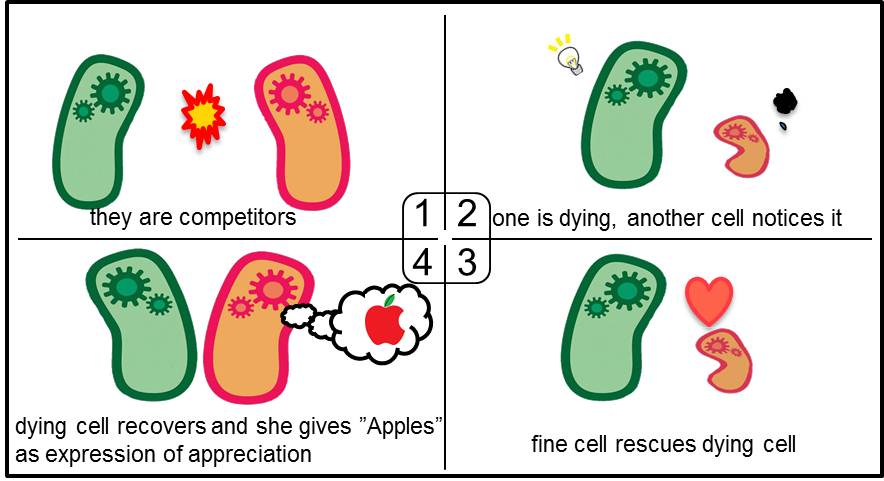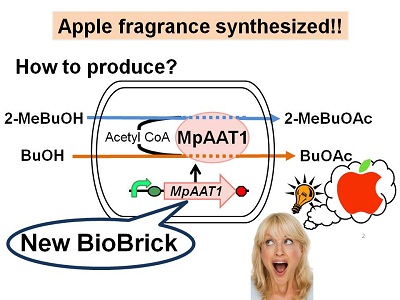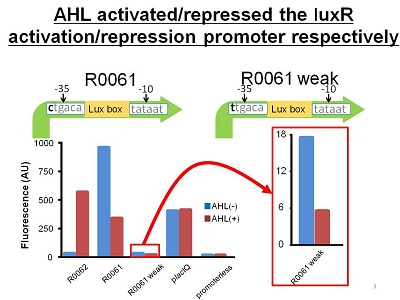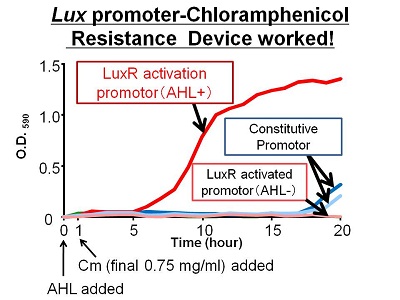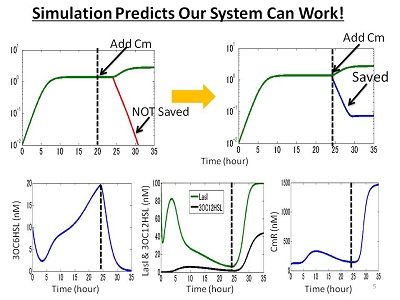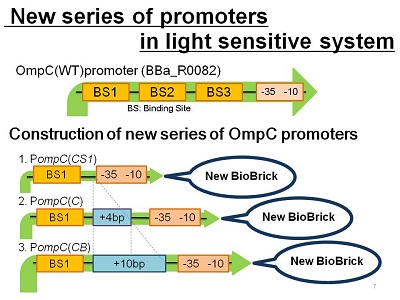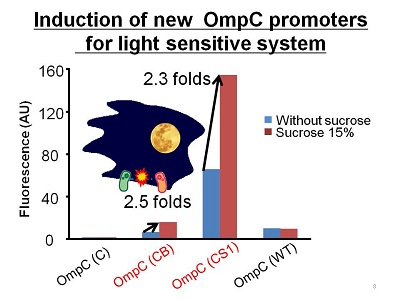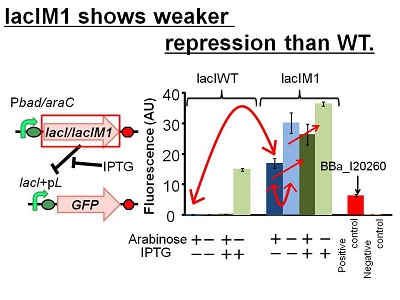Team:Tokyo Tech
From 2010.igem.org
| Line 56: | Line 56: | ||
<h2>3. Artificial Cooporation System</h2><br> | <h2>3. Artificial Cooporation System</h2><br> | ||
| - | |||
| - | |||
| - | |||
<h3>3-1. Genetic circiut of Artificial Cooperation System</h3><br> | <h3>3-1. Genetic circiut of Artificial Cooperation System</h3><br> | ||
| + | At section 1, we explained ''E. coli'' with humanity we want to create. We have already explained 4th illustration in the figure. | ||
| + | Next move on to 1st to 3rd illustration. In order to realize the idea, we constructed a system that named “Artificial Cooperation System" | ||
There are two types of ''E. coli'' in this system. These two types of cells recognize each other by Quorum Sensing. | There are two types of ''E. coli'' in this system. These two types of cells recognize each other by Quorum Sensing. | ||
| - | CellA & CellB carry LasI gene and LuxI gene respectively. To see the rescuing process, click on the | + | CellA & CellB carry LasI gene and LuxI gene respectively. To see the rescuing process, click on the play button in the flash to start |
[[Team:Tokyo_Tech/Project/Artificial_Cooperation_System|(See more…)]] | [[Team:Tokyo_Tech/Project/Artificial_Cooperation_System|(See more…)]] | ||
<html> | <html> | ||
Revision as of 12:42, 27 October 2010
0. Project motivation -What is humanity?-
What do you think humanity is?
This is a common question which human have tried for long time. Answer might be different in each person.
According to LONGMAN dictionary, humanity means,
“the state of being human rather than an animal or machine. For example, kindness, respect and sympathy towards others.”
Then is it really impossible for the other livings to have those?
Tokyo Tech 2010 challenged this question.
We designed E. coli with humanity in order to prove that sympathetic doesn’t exist only in human!
1. Concept -E. coli with humanity-
To make E. coli with humanity, we decided to engineer E. coli that behave kindly and have sympathy.
Below is a behavior of the E. coli with humanity we thought.
There are two kinds of cells. In normal conditions, they are competitors for survival. While in critical conditions, such that one is dying, another cell would notice the crisis of dying cell and help her.
She gives him “apples” as a expression of her appeciation.
The relationship like this exists in human beings.
2. Apple reporters
Our E. coli with humanity gives “apples” as expression of appreciation. It’s really difficult to make E. coli producing real apples.However,We succeeded in synthesizing two components of apples.
2-1. Color -Carotenoid synthetic pathway complete!-
This year, our team expanded the project of Cambridge 2009. We succeeded in synthesizing zeaxanthin by adding crtZ into crtEBIY likewise astaxanthin by crtZW. We could identify them by TLC.
Astaxanthin is the final metabolite of carotenoid synthetic pathway. (See more…)
2-2. Fragrance -We create Apple flavor in E. coli-
E. coli was modified to produces ester by addition of 2-MeBuOH or BuOH as a substrate.
This ester gives off apple fragrance. (See more…)
3. Artificial Cooporation System
3-1. Genetic circiut of Artificial Cooperation System
At section 1, we explained E. coli with humanity we want to create. We have already explained 4th illustration in the figure. Next move on to 1st to 3rd illustration. In order to realize the idea, we constructed a system that named “Artificial Cooperation System" There are two types of E. coli in this system. These two types of cells recognize each other by Quorum Sensing. CellA & CellB carry LasI gene and LuxI gene respectively. To see the rescuing process, click on the play button in the flash to start (See more…)
3-2. Lux repression promoter can work!
In order to construct Artificial Cooporation System, lux activation/repression device plays the key role.
Lux repression part has never been measured in iGEM while Lux activation part has measured by many iGEM teams. This year we assayed the activity of lux repression promoter. (See more…)
3-3. Antibiotic Activation Device
We introduced chloramphenicol resistance gene the downstream of lux activation promoter.
This device activate in the presence of AHL. Signal molecule activates antibiotic resistance gene. (See more…)
3-4. mathematical modeling of Artificial Cooperation System
We simulated Artificial Cooperation System and from this result, we predicted our system can work.
4. Full moon inhibits Artificial Cooporation system
In order to have a more intelligible& imaginable system, we tried to link our project to a famous& well-known character ”Wolfman”.
In our attempt to produce “wolfcoli”, we introduced light/switching function to the Artificial Cooperation System. Light sensitive promoter “PompC” and synthetic band detector circuit were used to perform function designed. (See more…)
4-1. New series of osmoregulative promoters
We introduced two new series of light sensitive promoters.
(See more…)
4-2. LacIMI showed weaker repression than WT
We characterized the activity of lacIM1 which is necessary for werewolf System. (See more…)
 "
"
